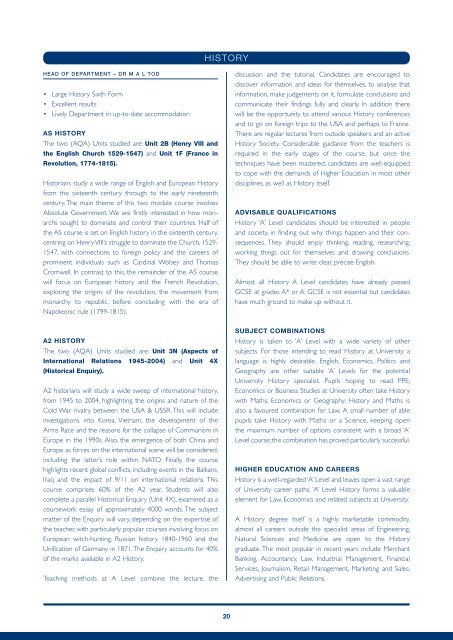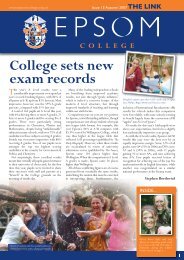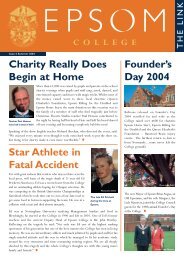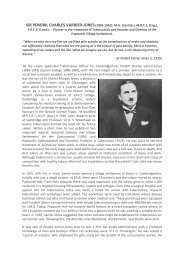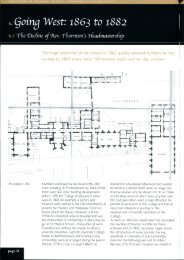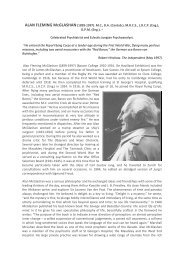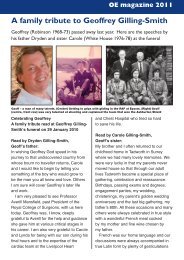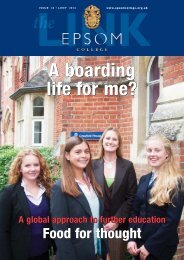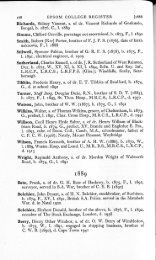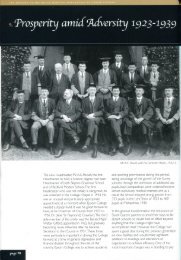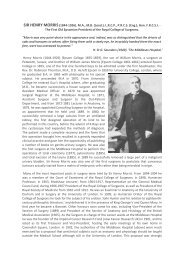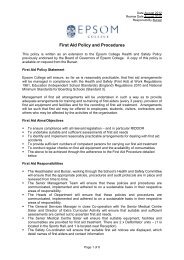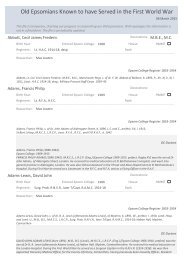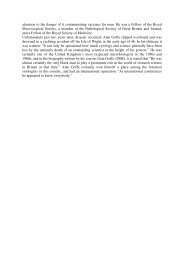Sixth Form Information Booklet 2014 - Epsom College
Sixth Form Information Booklet 2014 - Epsom College
Sixth Form Information Booklet 2014 - Epsom College
- No tags were found...
Create successful ePaper yourself
Turn your PDF publications into a flip-book with our unique Google optimized e-Paper software.
HISTORYHEAD OF DEPARTMENT – DR M A L TOD• Large History <strong>Sixth</strong> <strong>Form</strong>• Excellent results• Lively Department in up-to-date accommodationAS HISTORYThe two (AQA) Units studied are: Unit 2B (Henry VIII andthe English Church 1529-1547) and Unit 1F (France inRevolution, 1774-1815).Historians study a wide range of English and European Historyfrom the sixteenth century through to the early nineteenthcentury. The main theme of this two module course involvesAbsolute Government. We are firstly interested in how monarchssought to dominate and control their countries. Half ofthe AS course is set on English history in the sixteenth century,centring on Henry VIII’s struggle to dominate the Church, 1529-1547, with connections to foreign policy and the careers ofprominent individuals such as Cardinal Wolsey and ThomasCromwell. In contrast to this, the remainder of the AS coursewill focus on European history and the French Revolution,exploring the origins of the revolution, the movement frommonarchy to republic, before concluding with the era ofNapoleonic rule (1799-1815).discussion and the tutorial. Candidates are encouraged todiscover information and ideas for themselves, to analyse thatinformation, make judgements on it, formulate conclusions andcommunicate their findings fully and clearly. In addition therewill be the opportunity to attend various History conferencesand to go on foreign trips to the USA and perhaps to France.There are regular lectures from outside speakers and an activeHistory Society. Considerable guidance from the teachers isrequired in the early stages of the course, but once thetechniques have been mastered, candidates are well-equippedto cope with the demands of Higher Education in most otherdisciplines, as well as History itself.ADVISABLE QUALIFICATIONSHistory ‘A’ Level candidates should be interested in peopleand society, in finding out why things happen and their consequences.They should enjoy thinking, reading, researching,working things out for themselves and drawing conclusions.They should be able to write clear, precise English.Almost all History A Level candidates have already passedGCSE at grades A* or A. GCSE is not essential but candidateshave much ground to make up without it.A2 HISTORYThe two (AQA) Units studied are: Unit 3N (Aspects ofInternational Relations 1945-2004) and Unit 4X(Historical Enquiry).A2 historians will study a wide sweep of international history,from 1945 to 2004, highlighting the origins and nature of theCold War rivalry between the USA & USSR. This will includeinvestigations into Korea, Vietnam, the development of theArms Race and the reasons for the collapse of Communism inEurope in the 1990s. Also, the emergence of both China andEurope as forces on the international scene will be considered,including the latter’s role within NATO. Finally, the coursehighlights recent global conflicts, including events in the Balkans,Iraq and the impact of 9/11 on international relations. Thiscourse comprises 60% of the A2 year. Students will alsocomplete a parallel Historical Enquiry (Unit 4X), examined as acoursework essay of approximately 4000 words. The subjectmatter of the Enquiry will vary, depending on the expertise ofthe teacher, with particularly popular courses involving focus onEuropean witch-hunting, Russian history 1840-1960 and theUnification of Germany in 1871.The Enquiry accounts for 40%of the marks available in A2 History.Teaching methods at A Level combine the lecture, theSUBJECT COMBINATIONSHistory is taken to ‘A’ Level with a wide variety of othersubjects. For those intending to read History at University alanguage is highly desirable. English, Economics, Politics andGeography are other suitable ‘A’ Levels for the potentialUniversity History specialist. Pupils hoping to read PPE,Economics or Business Studies at University often take Historywith Maths, Economics or Geography; History and Maths isalso a favoured combination for Law. A small number of ablepupils take History with Maths or a Science, keeping openthe maximum number of options consistent with a broad ‘A’Level course; this combination has proved particularly successful.HIGHER EDUCATION AND CAREERSHistory is a well-regarded ‘A’ Level and leaves open a vast rangeof University career paths. ‘A’ Level History forms a valuableelement for Law, Economics and related subjects at University.A History degree itself is a highly marketable commodity,almost all careers outside the specialist areas of Engineering,Natural Sciences and Medicine are open to the Historygraduate. The most popular in recent years include MerchantBanking, Accountancy, Law, Industrial Management, FinancialServices, Journalism, Retail Management, Marketing and Sales,Advertising and Public Relations.20


